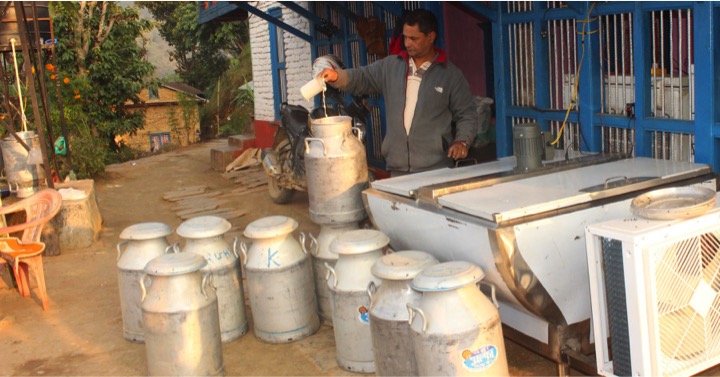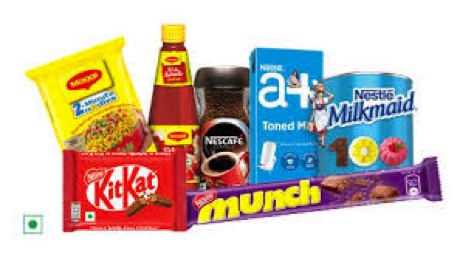Tirtha Acharya of Fikkal Bazaar, Ilam has been a dairy farmer for decades. He makes ghee and dog chew from the milk produced on his farm. He also buys milk from other farmers to make his various dairy products.
Last March, the government raised the price of milk paid to farmers, and since then, his sales have plunged. His products became just too costly.
The price paid to farmers was hiked by Rs9 per litre.
With business at a standstill, Acharya started supplying milk to the Biratnagar-based milk plant of Dairy Development Corporation (DDC). But when the plant stopped paying him, he sank into deep financial trouble.
“The factory owes me Rs1.5 million for my milk, and I have not received any money,” he said.
As the milk plant has not been making timely payments, Acharya says he has been buying cattle feed on credit.
According to Acharya, things were going well before the price of milk was raised. He used to sell ghee for Rs750 per kg and dog chew for Rs1,050 per kg.
“Now the price of each product has increased by Rs150 per kg. People have stopped buying dairy products. We have not received orders from buyers either.”
Dairy farmers at Hanse Dhunse Dairy Cooperative in Damak-3, Jhapa are similarly distressed.
The Biratnagar plant of DDC owes more than Rs3 million to the dairy farmers.
Gehanath Pokharel, president of Hanse Dhunse Dairy Cooperative, says the cooperative has been supplying milk collected from 325 farmers to the plant. The plant has not paid them since mid-April.
“The farmers have asked for their money several times, but the company officials are always making excuses,” said Pokharel.
The paddy transplanting season has started, and farmers need money to buy fertilisers and pay the farm hands.
Private dairies in Biratnagar say that customers have decreased sharply after the rise in prices of dairy products.
“Before the price hike, Nepali dairy products were exported to India. But now it is the other way around. Indian products are flooding our market,” said trader Dilli Ram Baral. “We have been forced to slash prices because no one is buying.”
According to local traders, around 40,000 litres of Indian milk enters Nepal daily through unofficial channels. They say local authorities have done little to stop the contraband.
Farmers in Koshi province have been selling their products to private dairies and the state-owned DDC in Biratnagar. But the farmers have not been receiving payment on time because of the decrease in sales.
Premeshwor Chaudhary, chief of the Dairy Development Corporation’s plant in Biratnagar, says they collect 26,000 litres of milk daily, but they are able to sell only 6,000 litres.
Moreover, milk deliveries from farmers have increased.
“Until a few years ago, farmers in Fikkal, Ilam and Garamani, Jhapa used to supply 200 to 300 litres of milk daily. But now they are bringing more than 6,000 litres a day,” said Chaudhary. “Milk is imported illegally from India.”
DDC said that sales of all dairy products like curd, cheese and sweets have plummeted because of the high prices.
“We have no option but to make milk powder from the milk,” said Chaudhary. He says their warehouse in Biratnagar contains 50 tonnes of butter and 20 tonnes of milk powder.
“As the inventory has been piling up, we are planning to move some of it to our warehouse in Kathmandu.”
According to Chaudhary, the increment in milk collection from the farmers and the drop in sales have disrupted the payment cycle.
In the past, the DDC plant in Biratnagar used to pay farmers every 15 days, but now it has not made any payment since mid-April.
“The total amount due to the farmers is around Rs60 million,” Chaudhary said.
Birendra Kumar Yadav, chief district officer of Morang, says they are serious about controlling milk smuggling from India.
According to the Directorate of Livestock and Fisheries Development in Biratnagar, there are 510,032 cows and 387,968 buffaloes in Koshi province. The annual output of milk is 525,155 tonnes.
“Milk production has been increasing lately, but sales have not been able to keep pace,” said Pashupati Dhungana, director of the directorate.
Lekh Raj Dahal, secretary of the Ministry of Industry, Agriculture and Cooperatives of Koshi province, said that more than 3,200 head of cattle had died due to the lumpy skin disease in Koshi province, but milk production is still growing.
“To deal with the problem of excess milk, we have requested private dairy plants to produce powder milk and other products such as chocolate,” said Dahal.





























